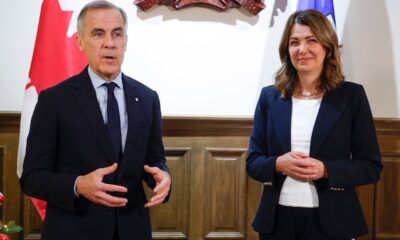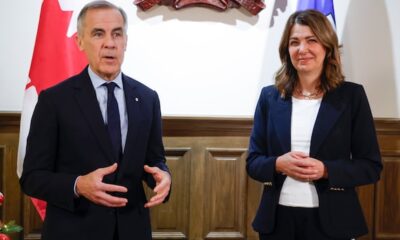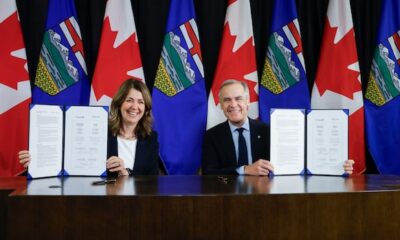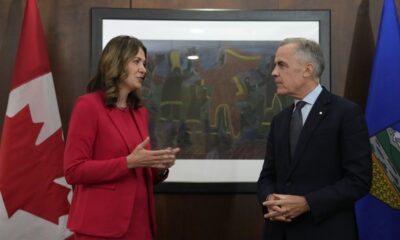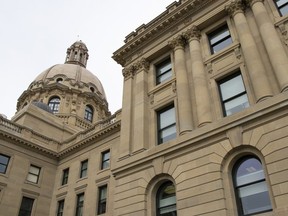Top Stories
NDP Leadership Candidates Clash Over Rebuild Plans Amid Pipeline Accord

UPDATE: NDP leadership candidates are urgently laying out their visions for the party’s future during a pivotal debate in Montreal today, just hours after Prime Minister Mark Carney signed a controversial pipeline accord with Alberta Premier Danielle Smith. This accord is reshaping climate policy discussions and has become a focal point for candidates as they seek to rebuild the party, which has seen a dramatic decline to just seven seats in the House of Commons.
The debate, held on July 13, 2023, showcased candidates including Rob Ashton, Tanille Johnston, Avi Lewis, Heather McPherson, and Tony McQuail as they confronted the urgent need to win back support from working-class Canadians. The candidates uniformly criticized the Carney Liberals’ recent shift to the right, but tensions were minimal, with candidates even sharing light moments, including McQuail offering homemade apple butter to his opponents.
While the candidates largely avoided the divisive pipeline issue during the debate, it emerged as a significant topic in post-debate discussions. Johnston vehemently opposed the pipeline’s northern route, declaring it would “never happen under my watch,” while Lewis condemned the accord as a “distraction” and the “sellout of the century.” Both candidates emphasized their commitment to environmental concerns, particularly in light of strong opposition from coastal First Nations in British Columbia.
The candidates shared a common goal of revitalizing the NDP’s base, but diverged on strategies. Ashton proposed targeted outreach in “union halls” and “shop floors,” advocating for government guarantees on jobs and support measures like price caps on essential goods. Meanwhile, Lewis pushed for broader public options, calling for a wealth tax to fund initiatives that address market failures.
McPherson, representing Edmonton, focused on the need for a national housing emergency, advocating for funds to build co-ops and combat homelessness. Johnston echoed calls for educational reform, emphasizing the end of fossil fuel subsidies and a commitment to racial justice within the party’s platform.
McQuail highlighted the necessity of electoral reform, warning that without addressing the first past the post system, the party’s ideas would remain unrealized. “I’ve been listening to speeches and great ideas for over 45 years,” he stated, stressing the urgency for systemic change.
As the NDP navigates this critical juncture, the debate marks a significant moment in shaping the party’s identity and future direction. The candidates’ contrasting visions reflect deep-seated challenges as they attempt to reconnect with their core electorate and redefine their stance on pressing national issues, including climate policy and economic inequality.
As the NDP embarks on this rebuilding effort, all eyes will be on how the candidates continue to address urgent issues like the pipeline accord and the broader implications for party unity and electoral viability. Stay tuned for ongoing updates as the leadership race unfolds and the candidates refine their approaches in response to these pressing challenges.
-

 Politics3 weeks ago
Politics3 weeks agoSecwepemc First Nation Seeks Aboriginal Title Over Kamloops Area
-

 World4 months ago
World4 months agoScientists Unearth Ancient Antarctic Ice to Unlock Climate Secrets
-

 Entertainment5 months ago
Entertainment5 months agoTrump and McCormick to Announce $70 Billion Energy Investments
-

 Lifestyle4 months ago
Lifestyle4 months agoTransLink Launches Food Truck Program to Boost Revenue in Vancouver
-

 Science5 months ago
Science5 months agoFour Astronauts Return to Earth After International Space Station Mission
-

 Technology3 months ago
Technology3 months agoApple Notes Enhances Functionality with Markdown Support in macOS 26
-

 Top Stories2 months ago
Top Stories2 months agoUrgent Update: Fatal Crash on Highway 99 Claims Life of Pitt Meadows Man
-

 Lifestyle3 months ago
Lifestyle3 months agoManitoba’s Burger Champion Shines Again Amid Dining Innovations
-

 Politics4 months ago
Politics4 months agoUkrainian Tennis Star Elina Svitolina Faces Death Threats Online
-

 Sports5 months ago
Sports5 months agoSearch Underway for Missing Hunter Amid Hokkaido Bear Emergency
-

 Politics4 months ago
Politics4 months agoCarney Engages First Nations Leaders at Development Law Summit
-

 Technology5 months ago
Technology5 months agoFrosthaven Launches Early Access on July 31, 2025



